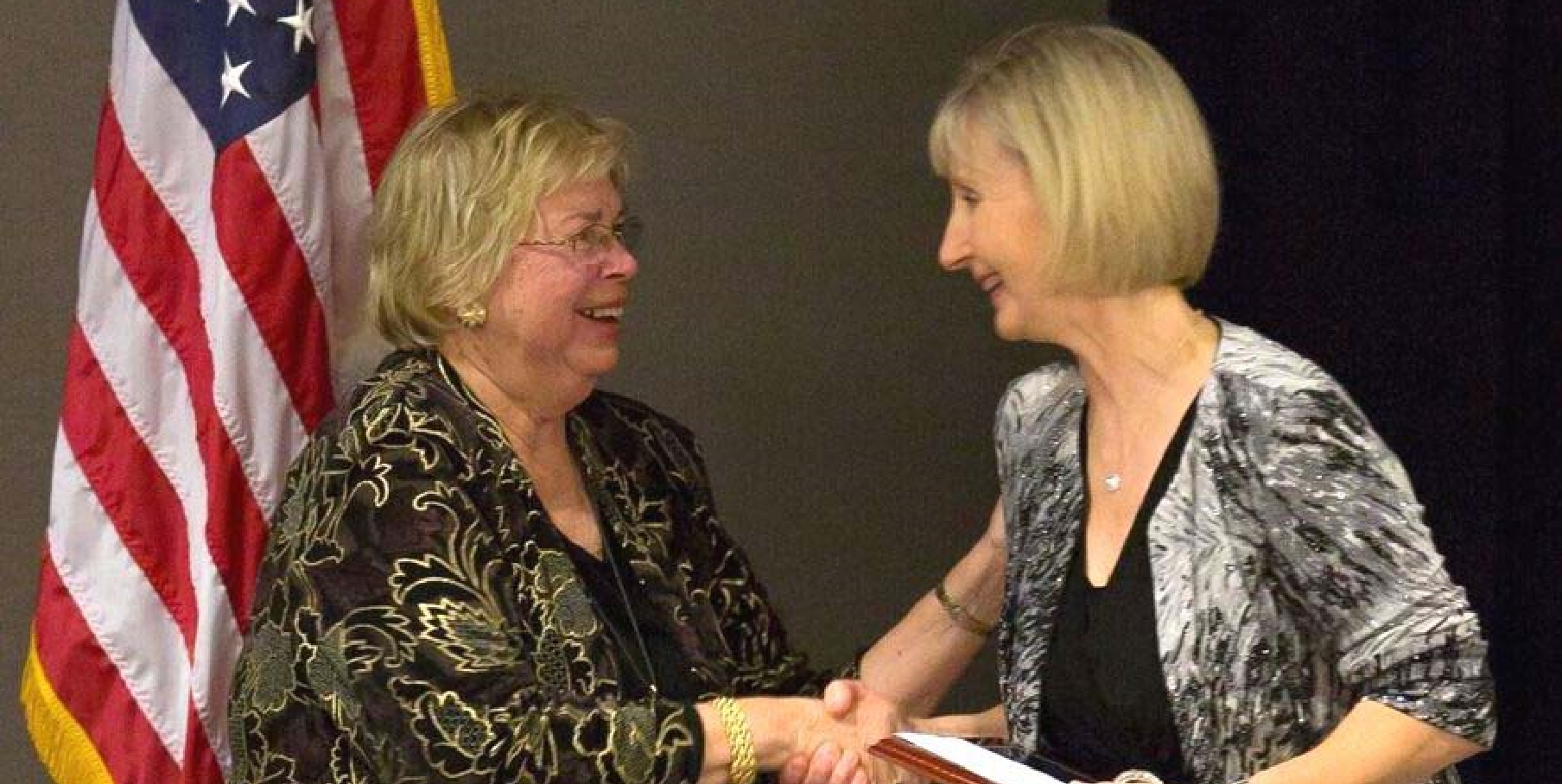The Estonian American National Council’s Awards Program recognizes exceptional individuals or organizations in America who should be noted for their contributions to Estonia or to the Estonian-American community, or to the broader American community in a way that has some connection to Estonia or the Estonian people. Formal awards are done every two to three years.
The awards can recognize many different kinds of contributions. Estonian-American individuals can be recognized for outstanding achievements, or for distinguished service related to Estonia or Estonian-American activities, including for outstanding contributions to the EANC. Organizations can be recognized for their outstanding contributions to Estonia or to the Estonian-American community. In 2016, eligibility was expanded to include Americans not of Estonian descent who may have made contributions to Estonia or the Estonian American community. As these awards are meant to recognize truly outstanding contributions, EANC will not necessarily give awards in all the above categories. Selections of recipients will be made by the EANC board.
ESTONIAN AMERICAN NATIONAL COUNCIL AWARDS HISTORY
The EANC awards tradition was established in conjunction with the Council’s 60th Anniversary Gala in Washington, DC on September 29, 2012. The awards recognize the work of exceptional individuals or entities in preserving and nurturing our Estonian heritage, culture and language in the United States, or for outstanding contributions in a field of endeavor.
Six general award categories have been established. Three categories are for individuals: one for “Outstanding Achievement,” one for “Distinguished Service,” one for ̏Outstanding Individual Contribution to the Estonian American Community,” and one for “Outstanding Contributions to EANC.” The fifth category is for “Organizational Excellence,” presented to an organization that has been of immense benefit to the Estonian American community or in introducing Estonia to the US. In 2016, a fifth category was created: “Friend of Estonian Americans” for non-Estonians who have significantly contributed to the Estonian-American community.
A Look at our Distinguished Awardees:

2012 EANC AWARDS
2012 “Outstanding Contributions to EANC” Award: Juhan Simonson
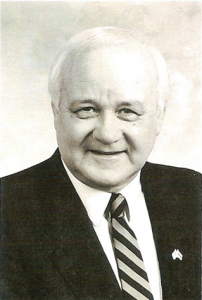
Juhan Simonson (1933-2012) was a tireless worker for the cause of Estonian freedom. He began his career in the Estonian American National Council in 1966 and remained a member until his death. From 1978-1996, as EANC president, Juhan led the organization through the turbulent years of re-establishment of Estonian independence. He was a key figure in the establishment of contacts between EANC and the new government of the Republic of Estonia after 1991. In recognition, he received the III Class Order of the White Star from the President of Estonia in 1998. The official listing in the Presidential directory of Estonia lists Simonson as “Freedom Fighter.”
Simonson also served in leadership roles in numerous other Estonian-American and Baltic-American organizations, including the Joint Baltic American National Committee, The Estonian Archives in U.S., the League of Friends of Estonian Scouts and Girl Guides, The Nordic Press, the Seabrook (NJ) Estonian Society, and the board of the Holy Ghost Lutheran Church of Lakewood (NJ). He had a distinguished career in public service in the state of New Jersey, serving as director of the New Jersey Office of Ethnic Affairs.
2012 “Outstanding Contributions to EANC” Award: Mati Kõiva
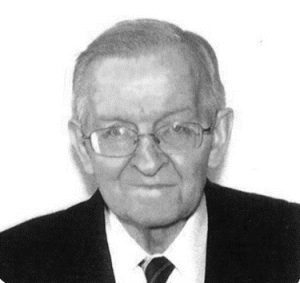
Mati Kõiva served in the Estonian American National Council for over 30 years, including nine years as president. He represented EANC in the Joint Baltic American National Committee, was a board member of the Estonian World Council for 12 years, and a board member of the Nordic Press for seven years (with four of those in the role of president). Kõiva has also been an active leader in Estonian American scout organizations, led the Connecticut Estonian Society, and served in leadership roles in the Chicago Estonian Society.
In recognition of these activities, Kõiva received the III Class Order of the White Star from the President of Estonia in 1998. The Presidential directory of Estonia lists him as “Freedom Fighter.”
Kõiva served with distinction in the U.S. Army, rising to the rank of Lieutenant Colonel before leaving the service. He worked in public service for the States of Connecticut and Maryland.

2012 “Outstanding Organization” Award: Estonian Archives in the U.S.
The Estonian Archives in the U.S. is an independent, nonprofit organization, whose goal is to promote and preserve Estonian cultural artifacts in the United States. For that purpose, it collects, preserves and makes available to the public all types of materials which touch upon Estonian history and culture, thereby promoting research and publications. Based in Lakewood, New Jersey, since 1974, its work is done with an all-volunteer force under the professional leadership of the current director Enda-Mai Michelson Holland.
The Archives has joined the Baltic Heritage Network, a multilingual electronic gateway established to gather and provide access to information on the cultural heritage of the Baltic diaspora. The Estonian Archives register of archival materials is available there electronically.
The Estonian Archives in the U.S. is an irreplaceable organization in collecting and maintaining the archival documents related to Estonian Americans, their organizations, and activities.
[photo caption: Enda-Mai Michelson Holland, Director]
2012 “Outstanding Achievement” Award: Dr. Olga Ritso Kistler
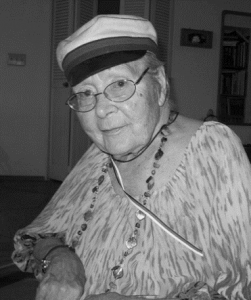
Dr. Olga Ritso Kistler (1920-2013) was born in Kiev, Ukraine and lost her mother and grandparents in the great 1921 Ukrainian famine when she was two years old. Her Estonian father was sentenced to Siberia, and she was sent to Estonia in 1923. She studied medicine at Tartu University; in 1944 she fled the returning Soviet forces. Eventually settling in the U.S., Dr. Ritso Kistler became a successful eye surgeon and married entrepreneur Walter Kistler.
This exceptional couple has been known for their generosity, as evidenced by the establishment of the Kistler Ritso Estonian Foundation (Kistler-Ritso Eesti Sihtasutus). Nowhere is the spirit of giving more evident to the Estonian-American community than in Olga Ritso Kistler’s founding of the Museum of Occupation in Tallinn, in 2003. The museum serves to show future generations the terrible realities of Soviet occupation, and what these meant to the Estonian people. In 2011, this museum established a collaboration agreement with Stanford University, thanks to a $4 million endowment to Stanford University from Walter and Olga Ritso Kistler. This program allows Stanford to expand its collections on Estonia and its recent history, and to appoint a curator for its collection. Olga and Walter Kistler also extended financial aid early on to the making of the film “The Singing Revolution.”
Dr. Ritso Kistler is a noteworthy role model of a life of generous giving to projects of lasting importance to Estonia and the Estonian-American community.
2012 “Distinguished Service” Award: Ambassador Melissa F. Wells
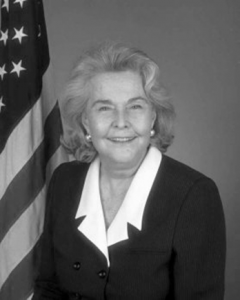
Ambassador Melissa Foelsch Wells, born in Tallinn, Estonia, is a career member of the Senior Foreign Service and the highest-ranking American diplomat of Estonian extraction.
Ambassador Wells joined the U.S, Foreign Service in 1958. Over her career, she served as United States Ambassador to Zaire, Mozambique, Guinea-Bissau and Cape Verde, and the United Nations Economic and Social Council. Ambassador Wells has also had assignments in Brazil, France, the United Kingdom, Trinidad and Tobago, Switzerland, and Uganda, as well as with the U.S. Departments of Commerce and State.
On November 3, 1998, Ambassador Wells was appointed as the U.S. Ambassador to Estonia, her fifth ambassadorial posting, but in her own words, a “special case,” of a “homecoming.” She served with distinction in that role until 2001, a fitting valedictory to a distinguished career in service to her country.

2014 EANC AWARDS
presented in Washington, D.C.
2014 “Distinguished Service” Award: Jaak Juhansoo
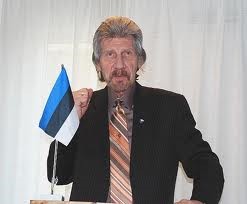
Jaak Juhansoo (1942-2017) was a longtime Estonian activist and former Estonian World Council president. He tirelessly contributed to Estonian liberation efforts by staging demonstrations, writing articles and giving interviews. Juhansoo was president and honorary member of the Boston Estonian Society, president and board member of the Baltic Society of New England, treasurer and board member of the Captive Nations Committee and longtime member of the Estonian American National Council (EANC). He also belonged to the Estonian World Council (ÜEKN) for three decades, serving as its president from 2007-2014 and treasurer thereafter.
Juhansoo received the White Star IV Order from the Estonian government in 2007, and the Canadian–Estonian award for freedom fighting in 2003.
Jaak’s concern for others was also reflected through his active engagement with the Salvation Army, Freemasons, and the Hurley House, a recovery home for alcoholics and addicts in Waltham, MA, for which he served on its Board of Directors.
2014 “Outstanding Organization” Award: The Nordic Press

The Nordic Press, Inc. is publisher of Vaba Eesti Sõna, the only Estonian-language newspaper in the United States. Founded in 1949 and published in New York, the newspaper will celebrate its 65th uninterrupted year of publication on June 11, 2019. For the Estonian diaspora, Vaba Eesti Sõna, or The Free Estonian Word, serves as an important information source on local Estonian American activities as well as news from Estonia. It serves readers across all of North America, as well as Estonia and other parts of the world.
Editors-in-chief have included Evald Roosare, Erich Ernits, Harald Raudsepp, Talvi Laev, Aire Salmre, Airi Vaga, and currently Kärt Ulman.
2014 “Outstanding Achievement” Award: James And Maureen Tusty
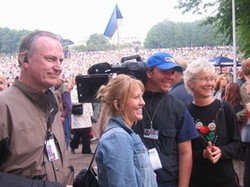
James and Maureen Tustys are producers of the widely-viewed films “The Singing Revolution” and “To Breathe As One.” James Tusty is Executive Producer and Co-Filmmaker along with his wife, Maureen, in their company Sky Films, Inc.
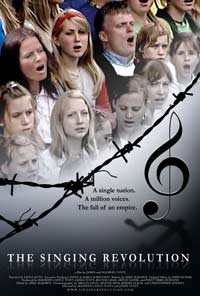
Their most noted collaboration is the film documentary “The Singing Revolution,” which tells the story of Estonia’s non-violent massive singing demonstrations and their role in the collapse of the Soviet Union. Released in 2008, “The Singing Revolution” generated over 300 million press impressions, reached 125 North American theatrical markets, and is used as course material in schools throughout the United States.
The 2014 release “To Breathe As One” showcases Estonia’s “Laulupidu” Song Festival from the perspective of the participating Piedmont East Bay (CA) Children’s Choir. It achieved more an 1,000 broadcasts on public television stations, reaching twenty of the Top 25 markets.
2014 “Outstanding Organization” Award: The Estonian Boy Scouts
2014 “Outstanding Organization” Award: The Estonian Girl Guides
 Scouting has had a long tradition in Estonia, beginning in 1911. Carrying on this tradition, the Estonian Girl Guides and Boy Scouts in the USA have played an important role in involving the next generations with their Estonian heritage and traditions. The annual scouting jamborees at the scout campgrounds in Lakewood, New Jersey, are considered the highlight of the scouting year.
Scouting has had a long tradition in Estonia, beginning in 1911. Carrying on this tradition, the Estonian Girl Guides and Boy Scouts in the USA have played an important role in involving the next generations with their Estonian heritage and traditions. The annual scouting jamborees at the scout campgrounds in Lakewood, New Jersey, are considered the highlight of the scouting year.
Today, Eesti Gaidide Malev USA-s and Eesti Skautide Malev USA-s (Estonian Girl Guides and Boy Scouts in the USA) carry on the scouting tradition of “OLE VALMIS!” / “BE PREPARED!”
2016 EANC AWARDS
presented at the EANC Annual Meeting and Awards Gala in San Francisco, California
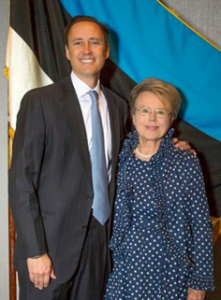
2016 “Outstanding Achievement” Award: Steve Jürvetson
EANC recognizes Steve Jürvetson’s contributions to Estonian American society and culture, especially in helping fund and produce the award-winning film “The Singing Revolution.” In 2013 he was an organizer and keynote speaker for Innovative Estonia Silicon Valley (“IEstonia”), an event which introduced Estonian entrepreneurship and technical service developments to Silicon Valley investors. His support and advocacy helped launch E-residency of Estonia; Jürvetson became e-resident #2.
Jürvetson has had many successes in venture capital investment, where he was an early investor in Hotmail, in Tesla, and in Estonia’s own Skype. He was named in Forbes’ “Midas List” of Tech’s Top Investors for five years and Deloitte’s “Venture Capitalist of the Year” in 2012.
2016 “Outstanding Organization” Award: Estonian League of the West Coast
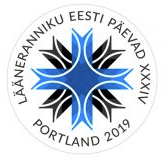
The Estonian League of the West Coast / Eesti Organitsioonide Liit Läänerannikul (EOLL) is awarded EANC’s highest recognition for an Estonian American organization for its tremendous contributions over the past 60 years in preserving Estonian American culture and community on the West Coast, through the biannual West Coast Estonian Days festival (LEP). Many thousands of Estonian Americans have been impacted by the 32 LEP festivals held to date in San Francisco, Los Angeles, Portland, Seattle and Vancouver B.C.


During the years Estonia was part of the Soviet Union, the LEP was at the heart of ongoing efforts to make Estonia’s story public and to instill political action. More recent LEPs have celebrated new connections with the Estonian homeland, invited performers and participants from afar and encouraged new collaborations.
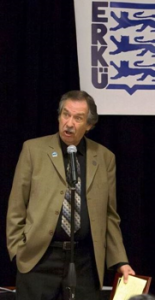
2016 “Friend of Estonian Americans” Award: Lonnie Cline
This new “Estophile” award honors non-Estonians who have contributed to the Estonian American community. Lonnie Cline, who has for over 20 years instilled thousands of singers with the beauty and joy of Estonian choral music, is the first recipient.
Cline, then choral director at Oregon’s Clackamas Community College, heard Estonian choral music for the first time in the early 1990’s, and instantly fell in love with it. In 1996 he founded the now internationally recognized Unistus (“Dream”) chamber choir, forging lasting ties between Oregon and Estonia, and spreading Estonia’s Singing Revolution story to ever broader audiences. Unistus has performed at three Song Festivals in Tallinn, the 2000 ESTO in Toronto, 11 West Coast Estonian Days festivals, 22 Estonian Independence Day celebrations in Portland, and hosted and collaborated with visiting Estonian choirs and directors.
2016 “Outstanding Contributions” to EANC Award: Arne Kalm
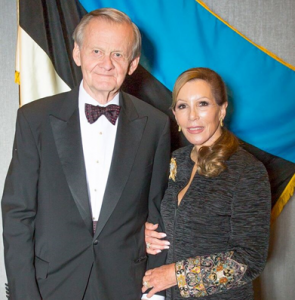
The 2016 Outstanding Contributions to EANC Award recognizes Arne Kalm’s many years of service (five terms) as an elected Council member and Board member, taking on many leadership roles, including EANC’s investment and strategic planning committees. He has been a strong voice for strengthening the EANC and its role in the Estonian American community.
Kalm is an Estonian-born American businessman and finance specialist, now retired, who has been an active member of the Los Angeles Estonian community and has held leadership positions in the Estonian League of the West Coast, including vice president in 1961-63 and president in 1997-99. In April 2016, he was honored with the Baltic American Freedom League (BAFL) Award. He is the author of the book, “Baltic Musketeers in the U.S. Congress,” a history of the first resolutions in the U.S. Congress seeking freedom for Estonia, Latvia and Lithuania.
2016 “Outstanding Contribution” Award: Lehti Merilo and Liina Teose
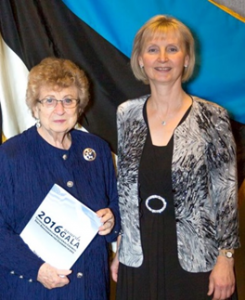
The awards presented to the mother-daughter team Lehti Merilo and Liina Teose recognize their many years of leading the Portland, Oregon, Estonian folk dance troupe “Tulehoidjad” (Keepers of the Flame). Through folk dancing and music, they have been instrumental in keeping Estonian culture alive and have played a major role in introducing Estonia to Portland and other West Coast cities in the U.S. and Canada.
Lehti Merilo founded Portland’s first Estonian folk dance troupe “Tulehoidjad” in 1950. and was its leader for 35 years (1950-1985). Ms. Merilo also taught folk dancing to children when the Portland Estonian Supplemental School started in the 1960’s. Tulehoidjad performed at numerous venues including the biennial West Coast Estonian days (1953-1985) and at the Portland International Folk Festival in 1980. In 2015, Lehti Merilo received the gold badge award from the Estonian Folk Dancing and Folk Music Society.Liina Teose, Lehti Merilo’s daughter, made her debut at age 2 in the Estonian children’s folk dance troupe led by her mother. In 1985, she took over leading Tulehoidjad and is in her 31th year as director. Tulehoidjad has continued performing at the biennial West Coast Estonian Days; in 1995 and 2003, Liina was the producer of the Folk Festival program for the event. Tulehoidjad performed at ESTO 1996 in Tallinn, Estonia, and in 1984 and 1996, Ms. Teose produced the folk dance portion of the ESTO programs. In 2013, Liina Teose received the Estonian Foreign Minister’s Certificate of Recognition for her work in promoting Estonian culture. In 2015, Ms. Teose received the silver badge award from the Estonian Folk Dancing and Folk Music Society.
2019 EANC and JBANC AWARDS
presented at the EANC Annual Meeting and Awards Gala in Washington, D.C.
The 2019 Awards Gala, hosted by EANC, brought together a special representation of not only the Estonian American community, and also representatives of the community of Americans with roots in the wider Baltic region: the countries of Estonia, Latvia and Lithuania. As stated by the EANC president, 2019 was a year of many shared anniversaries and, for this reason, it was the right time to share the stage with the Joint Baltic American National Committee, to highlight our common histories and share reflections on joint accomplishments.
On behalf of the Estonian community in the United States, we applaud the 2019 awardees and offer a heartfelt Thank you! for their dedication, decades of service and effective commitment to defending the interests and security of the Baltic nations, for preserving and promoting our cultures, and continuing to introduce Estonia, Latvia and Lithuania to the people and institutions of the United States.
EANC is pleased to introduce the 2019 honorees:
2019 Distinguished Service Award: Bishop electus Thomas Vaga
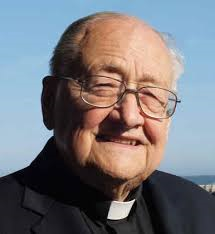
Bishop electus Thomas Vaga has served the Estonian community for decades in many capacities, from Scoutmaster to Bishop.
Thomas Vaga was born March 8, 1938 in Kuressaare, Estonia and fled Estonia with his family in 1944. After five years in a displaced persons’ camp, the Vaga family was sponsored and immigrated to the United States, where they, along with many other Estonian refugees, were given work at Seabrook Farms in southern New Jersey.
As a student at Rutgers University, Õpetaja Vaga joined the Estonian fraternity Eesti Üliõpilaste Selts, and later served as president of its New York, Vancouver, Canada, and Stockholm, Sweden chapters. In 1964, Thomas went to Finland as a representative of the fraternity and the Estonian Students Fund in USA. There, he and his wife Airi were active in the mission Jesus to the Communist World, also known as Voice of the Martyrs. The mission smuggled Bibles into the Soviet Union and Soviet-occupied countries, including Estonia, and secretly obtained and disseminated information about the persecution of Christians behind the Iron Curtain. Õpetaja Vaga made contacts with human rights groups in Estonia and the Soviet Union (Sakharov groups) and assisted in delivering their appeals to the United Nations and Amnesty International.
During his first year in Finland, Thomas became an active believer in Jesus Christ and soon started his theological studies in the University of Helsinki. In 1975 Thomas was ordained as a pastor of the E.E.L.K. (in exile) in St. James Lutheran Church (Jakob’s kyrkan) in Stockholm. He spent four years serving four Estonian congregations in Sweden and then 10 years with the Estonian Lutheran Church in Vancouver, Canada.
For the last 34 years he has served four Estonian congregations on the U.S. east coast, pastoring members in their personal and spiritual joys and sorrows while keeping alive the Estonian heritage and culture. Participants in several Estonian-language tour groups to the Holy Land recall fondly his leadership and knowledge of the Bible and religious history during those memorable trips.
Thomas Vaga served as an archbishop in the Church Consistory and, while acting archbishop from 2006 to 2007, he organized the election of a new archbishop. Thomas was elected bishop of E.E.L.K. by the Church Synod meeting in 2015.
In addition to his pastoral duties, Thomas Vaga has been a Scoutmaster in the Estonian Boy Scouts and Chief Chaplain in the USA since 1987; a member of the governing council and vice president of the Estonian Archives in the U.S.; and a member of Estonian American National Council (EANC). From 1990 to 1992, he was a US representative to the Congress of Estonia, a legislative body formed to restore Estonian independence during of dissolution of the Soviet Union. He was awarded the Republic of Estonia’s Order of the White Star IV class (Valge Tähe IV klassi teenetemärk) in 2008 for upholding Estonian culture in the United States and promoting church life.
2019 Organizational Excellence Award: Estonian Relief Committee, USA (Eesti Abistamiskomitee Ühendriikides)
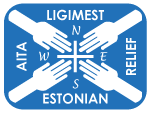
The Estonian Relief Committee (ERC) provides crucial financial support for Estonians and Estonian organizations in the United States and abroad.
Eesti Abistamiskomitee Ühendriikides was established in 1941 “to relieve and mitigate the suffering of Estonian citizens” who were impacted by the Soviet invasion and subsequent deportations of Estonian citizens. The idea originated with the Estonian Consul to the U.S. Johannes Eduard Markus. The ERC became the first Estonian relief organization of its kind and served as a model for Estonian relief committees that sprang up in other countries throughout the world.
From 1948 to1952, the ERC expanded its efforts to helping the flood of Estonian refugees. It provided financial aid, matched refugees with sponsors who arranged jobs and housing, and generally ensured just treatment. Together with the New York Estonian Evangelical Lutheran Church, the ERC enabled over 12,000 Estonians to immigrate to the USA. These included Estonians who crossed the ocean in small sailing vessels called “Viking boats” (an especially dangerous voyage) as well as those that spent time as DP’s” in displaced persons’ camps in Germany.
In the 1950’s the ERC donated funds to Estonian children’s summer camps in Germany and provided seed money for the construction of an Estonian War Veterans Home in Germany. In the 1960’s, the ERC expanded its support to include Estonian youth groups and cultural activities in North America by helping to underwrite the Lakewood Estonian Girl and Boy Scout Jamborees of 1964 and 1967 (Koguja). In Germany, they donated to the Episcopal Grandparents Plan (Vaderabi) for Estonian children in Oldenburg. In the 1970s and 1980s the ERC prepared aid packages that were delivered via Sweden to needy Estonians.
As Estonia’s government and its charitable organizations increase their support of the local population, the mission and scope of the ERC have evolved to meet the needs of an independent Estonia and new generations of Estonian-Americans. In the 1990’s, the ERC expanded its charitable activities to include Estonian children’s hospitals, nursing homes, soup kitchens, indigent families with many children, the handicapped, and orphans caused by the sinking of the Tallinn- Helsinki ferry Estonia. The ERC continues to support the Estonian Association of Injured Soldiers. In the U.S., the ERC plays a vital role in many aspects of community assistance. It supports Estonian youth and cultural organizations, such as the children’s camps in Lakewood and Long Island, the Estonian Boy and Girl Scouts, Estonian Lutheran confirmation camp, folk-dancing groups, and choirs.
Past Presidents of the ERC include Salme Kaiv, Aleksandra Berg, Erich Harkna, Rudolf Kiviranna, Alfred Anderson, Paul Saar, Voldemar Vaher and Endel Reinpold. One of its longest-serving members is Virve Vaher, who started with the organization in 1989 and remains involved today. The ERC, comprised of all volunteers, is advised by a council of members and run by a board of directors and officers. Today, the ERC is led by its dedicated president Toomas Kilm. Vice President Helena Otsa accpeted the award on behalf of the organization, and dedicated the award to Virve Vaher and her inspiring commitment to their cause.
2019 Outstanding Organization Award: Baltimore Estonian Society (Baltimore Eesti Selts)
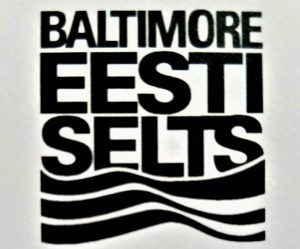
For over 80 years, the Baltimore Estonian Society has kept the Estonian community in the Baltimore area together and brought attention to Estonia and Estonian-Americans.
The Society was organized in January 1936, its Constitution and by-laws were adopted on November 28, 1940, and it was incorporated on April 17, 1945. The Society kept its members informed through its newsletter (Bulletään), published 10 times a year. While also at times using other venues, for many decades its base of operations was the Baltimore Estonian House. The Society was a significant contributor of funds for acquiring and renovating the Baltimore Estonian House (“Eesti Maja”), which housed the Estonian school and hosted meetings, practices, social gathering, and cultural events. The “Eesti Maja” also played an important role as the venue for the annual celebration of Estonia’s Declaration of Independence (1918). The annual Christmas bazaar was an especially popular event, attracting vendors and customers from throughout the east coast.
Members of the Baltimore Estonian Society were key players in the herculean effort of planning and executing the worldwide Estonian festival Esto ’76, the Estonian salute to the American bi-centennial celebrations. Esto ’76 attracted thousands of people of Estonian heritage from around the world to Baltimore, and drew attention to the plight of Soviet-occupied Estonia and its demands for freedom like that being celebrated in America.
In 1992, an Estonian ship captained by Heimar Malk arrived in Baltimore Harbor without a regulation-size “sini-must-valge,” or Estonian flag. Captain Malk contacted members of the local Estonian community and the Baltimore Estonian Society, who promptly took action. The ship was flying a regulation-size flag by the time it departed Baltimore Harbor. This is the kind of impact that the Baltimore Estonian Society has had and the important role it has played in the local community and the Estonian-American community more broadly. The Society has been the glue that unites the Baltimore Estonian community and has served as a vital link connecting Estonian-Americans to their ancestral land, language, and culture. Current president Peeter Saar accepted the award on behalf of the society.
2019 Outstanding Organization Award: Estonian folk-dance group Pillerkaar and the 2019 Outstanding Service Award to Pillerkaar founder Ms. Anu Oinas
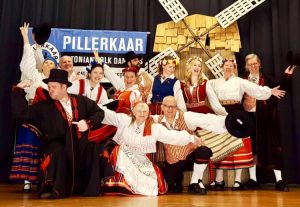
Anu Oinas (pictured front, center) founded folkdance-group Pillerkaar in 1971. Under her leadership and instruction, the group quickly flourished. The next year, 24 couples from the group attended the Estonian World Festival in Toronto, Canada. Pillerkaar has graced stages, stadiums and festivals with their energy and talents ever since.
With Ms. Oinas at its helm, Pillerkaar grew so big that it encompassed three different dance troupes: one for youth, another for adults, and a third for seasoned dancers. When Estonian folk dancing started to wane in the United States in the early 2000s, Anu Oinas led a new charge by launching IREKS, Ida Ranniku Eesti Küla Simman (East Coast Estonian Village Soiree). Ms Oinas and Pillerkaar spent many hours planning and preparing. Performances included Estonian, Lithuanian, and Latvian music and dance. The event brought together over 500 people and inspired dance groups up and down the East Coast.
In 2019, Anu Oinas was recognized by the Estonian Foreign Ministry as Citizen Diplomat for her contributions to teaching and preserving Estonian folk dance and to introducing Estonian culture for over 40 years.
When Anu Oinas retired in 2015, Jeff Zelek and Kadri Kallas Zelek took over directing the group. Pillerkaar continues to bring together enthusiastic dancers from the Washington, DC area for weekly practices and periodic performances. The group has traveled all over the world to perform at Estonian World Festivals and regularly performs in its local Washington, DC metro area. It has performed at the NATO Festival, ScanFest, the World Bank, various embassies, and countless local festivals in the DC area. For almost 50 years, Anu Oinas and Pillerkaar have been instrumental in bringing Estonians together to enjoy their own traditions and in providing a colorful glimpse of Estonian culture and people to the American public.

2023 EANC AWARDS
presented at the EANC Annual Meeting and Community Celebration in Lakewood, New Jersey
2023 Outstanding Individual Contribution Award : Ms. Külli Rannamäe

Külli Rannamäe is a long-time active member of the Estonian community in the New Jersey area, most appreciated in her role as the principal of the Lakewood Estonian School, which now spans ~30 years. Local Estonian school activity had ceased for some years, and it was Külli who made the commitment to resurrect the school and connect new community members, so they could maintain Estonian ties, language, and appreciation for Estonia and the Estonian language. The school enrollment changes per the demographic tides, but Külli has fostered a resilient and thorough school program, that tends to supplementary education of students of Estonian as well as mixed ethnic backgrounds. They attend on Friday nights to learn about culture and customs, history, language and community. Not only do the children learn for themselves, they are encouraged and taught to participate and perform in public events on special occasions, to take part in community activities. Külli takes part in national programs, seminars, conferences and meetings with peers to keep the school viable and accessible. Under her watch the Estonian shool choir was also able to participate as part of the East Coast Children’s Choir “Laulurõõm” at the Estonian Youth Song Festival in 2019. She and her husband Ivar have proudly praised two sons, who are fluent in the Estonian language and equally proud of their Estonian heritage. Külli is a strong and dedicated force, with a mission to keep the Estonian School in Lakewood functioning and vibrant.
2023 Outstanding Organization Award: Eesti Spordiliit USAs (Estonian American Amateur Athletes Association)
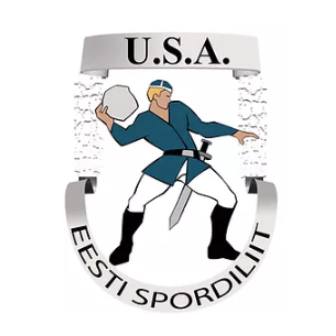
The year 2024 will mark the 70th anniversary of Eesti Spordiliit USAs, an organization that is to be commended for its continuous work in bringing together young Estonians and those Estonians young in spirit for fair and healthy athletic competition. Spordiliit is perhaps best known for its annual Eesti Mängud competition weekends and programs (affectionately know for years as ´spordipäevad´), held the first weekend in August of each year. It is this event that brings droves of individual athletes, families, and volleyball teams to the Lakewood Estonian House grounds and to sporting venues in the neighborhood, where they are cheered on by the public, Estonians an friends, both young and old. It is not unusual to see a chartered bus or RVs in the parking lot, as the event and evening cultural program attracts a vast public of all ages, including sports enthusiasts and friends from Canada. Spordiliit also hosts and organizes other events during the year, including the early summer Long Islandi Spordipäev, golf outings at various golf courses, and nearly 60 years of ESTO SKI weekends that, even in the bite of Winter, bring together Estonians from the US and Canada. Spordiliit is also a supporter of sports in the various Estonian youth camps in the USA, often serving as a sponsor for new equipment and facility improvements, and providing support staff and fitness instructors to help involve the youngsters.
EANC would most like to commend Spordiliit for regularly welcoming young members into the Board of Directors and its mix of counsellors. This serves well the EAAA mission: Committed to creating sporting experiences and events that bring Estonians together to celebrate their friendships and culture. Current EAAA president Tarmo Pallop accepted the award on behalf of the organization, and also called to the podium members of the board.
The ESL emblem (above) was developed by the artist Peet Aren and depicts Estonian folklore hero Kalevipoeg launching a large stone.
